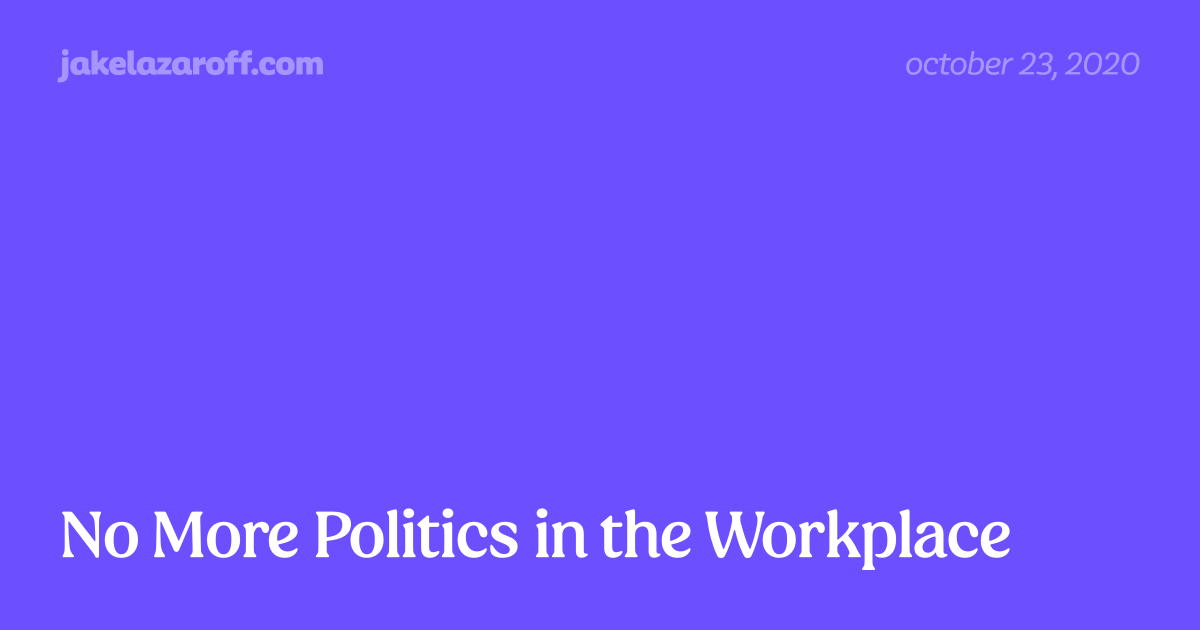What Counts as Politics in the Workplace?
Yesterday, Basecamp CEO Jason Fried announced that they will no longer tolerate political discussions Changes at Basecamp At Basecamp, we treat our company as a product. It's not a rigid thing that exists, it's a flexible, malleable idea that evolves. We aren't stuck with what we have, we can create what we want. Just as we improve products through iteration, we iterate on our company too. Recently, we've made some internal company changes, which, taken i...
world.hey.com/jason/changes-at-basecamp-7f32afc5 at work (quickly scaled back to “on our company Basecamp account


 No More Politics in the Workplace | jakelazaroff.com Criticism of the Expensify email is conveniently selective.
No More Politics in the Workplace | jakelazaroff.com Criticism of the Expensify email is conveniently selective. jakelazaroff.com/words/no-more-politics-in-the-workplace/ , the ensuing discussion fractured along predictable lines, although Basecamp’s employees seem to be solidly against the changes.
Regardless, CTO David Heinemeier Hansson has since doubled down Mosaics of positions If you learn enough about someone, you'll eventually be disappointed or dismayed. This is nature, this is normal. While some conservatives love to throw the word snowflake around as an insult, I take it as a compliment. The most interesting people I know really are unique, quirky, and even contradictory. To illustrate, I'm going to lis...
world.hey.com/dhh/mosaics-of-positions-ae6d4d9e , and I think his response is instructive of the disconnect between the people defending the policy change and the people criticizing it:
But those first six? There are very few people who I’d willingly sit down to have a good-faith, substantial discussion with about those. Because the odds are that we’ll run sour quickly. Those debates need the right context, the right people, the right frame of mind. And at work? No, never. Especially at work! Especially because work involves all sorts of delicate power balances already. If I end up in a debate with an employee at Basecamp that hits identity bedrock, we’re both going to be put in a hard situation (and the odds are low that any of the rocks are going to move).
In other words, “work is not an appropriate place to debate these issues”. The problem is that the people on the other side aren’t actually calling for debate. So let’s see if we can bridge the gap. What, exactly, counts as politics in the workplace?
Imagine that one of the statements DHH named involves which bathroom trans people should use. That’s a Hot-Button Political Controversy that hits the identity bedrock he’s talking about! People have strong opinions, and they probably won’t be swayed by a water cooler discussion.
Now imagine that Basecamp hires a trans employee. Which bathroom should they use?
This is the crux of the matter. People don’t want to have flame wars about Black Lives Matter on the company chat — they are worried about a culture that politicizes their identity and then prohibits “politics”.
Can Black employees talk about experiences of racial profiling? Can gay employees mention their spouse in a way that reveals their sexual orientation? Can employees with trans children boast about their kids’ sports achievements? Can women discuss instances of harassment within the company? It’s easy to draw a hard line against politics if you have never been politicized.
I’ve seen people hand waving and saying that obviously, those would be allowed. But Basecamp has construed politics extremely broadly (“every discussion remotely related to politics, advocacy, or society at large quickly spins away from pleasant”) and people are reasonably worried that politicized aspects of their identities would be unwelcome. Even if you knew for sure that Basecamp wouldn’t consider those examples political, there are plenty of people jumping in to defend this policy — and way more watching from the sidelines — about whom you couldn’t make the same guarantee. Marginalized employees still have to come to work worrying whether an aspect of their identity is “too political” to bring to the office.
To make matters worse, there are people who are convinced there is a cabal of “woke employee activists” hell-bent on subverting these organizations that must be stopped at all costs. That’s why anodyne proposals like renaming git branches  Tech Confronts Its Use of the Labels ‘Master’ and ‘Slave’ Companies and programmers are reexamining how technical terms are used amid Black Lives Matter protests. But some worry the changes are empty symbolism.
Tech Confronts Its Use of the Labels ‘Master’ and ‘Slave’ Companies and programmers are reexamining how technical terms are used amid Black Lives Matter protests. But some worry the changes are empty symbolism. www.wired.com/story/tech-confronts-use-labels-master-slave/ generate such huge controversy: these zealots see it as a slippery slope, where any compromise means ceding ground in a culture war.
The problem with that perspective is that the current state of things is every bit as political as the suggestion to change it. Put another way: any deviation from the status quo can be cast as political.
Prohibiting all these discussions doesn’t actually get rid of politics. It ossifies the political decisions of those who were in power when the original decisions were made, telling those who would object that their discomfort is subordinate to the illusion of peace. The appearance of conflict is gone, but problem still festers, and people will continue to be unhappy until it’s addressed.
The most frustrating part of all this is that it doesn’t seem to be in response to anything in particular. Basecamp’s employees, who apparently all found out via the blog post Tweet / Twitter twitter.com/georgeclaghorn/status/1387041235697901571 , seem genuinely blindsided by it Tweet / Twitter
twitter.com/Rahsfan/status/1387040932101386246 . This leaves the impression that there’s no actual problem to be solved here. Jason and DHH are prohibiting political discussions to combat an enemy that exists only in their heads.
This is basically par for the course for the “leave the politics at home” crew. The employee goal is never a mad power grab, nor is it to mire organizations in endless political debates. It’s simply to be inclusive of everyone, because we recognize that “politics” isn’t an academic topic hermetically sealed off from the rest of people’s lives. There are facets of our selves that are inherently political, and it’s not possible to check them at the door.